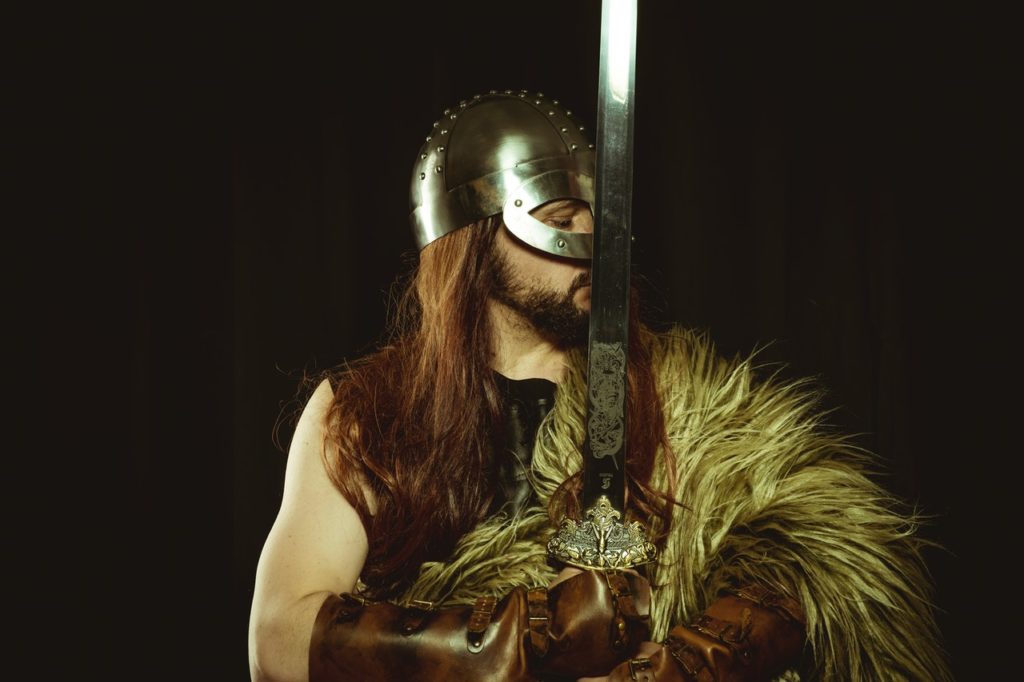
I learned this today. Vikings is the name given to the seafaring people from Scandinavia who raided through Europe from the late 8th century to the late 11th century. The Vikings didn’t call themselves “Vikings” and the word wasn’t used to refer to all of the people and the time period until the early 18th century.
Vikings came from Scandinavia: modern day Norway, Denmark, and Sweden. Most of them spoke Norse and they were called Norse or Danes. Hence the Danelaw in England.
A lot of old Norse words have remained in English, testament to the impact they had on England. For example: ransack, slaughter, bylaw, husband, law, loan, skill, thrift, bug, bull, dirt, dregs, mire, muck, rotten, call, gawk, give, haggle, run, scare, stain, axle, bag, bulk, cake, egg, glove, knot, loft, mug, seat … … and on and on.
The Viking age is taken to be from 793 to 1066. In 793, the Norsemen made their first real raid into England. Although, at this time, there was no concept of England as a country. It was more a grouping of Anglo-Saxon kingdoms. In fact, it was having to come together to fight against the Danes that forced England to unify.
The Viking invasions into England started as opportunistic searches for wealth. The first sites that were attacked were religious centers. Lindisfarne is the location of the first major Viking attack in England, and this is because, as a monastery, it had a lot of easily removable wealth and no real defenses. Word of this easy attack spread, and the next few attacks were also religious settlements.
During these attacks, the Vikings realized that there was a lot of fertile farmland available and they started to bring their families with them on future raids. Rather than raiding and taking the treasure home, they stayed and started settlements. In 865, Halfdane and Ivar the Boneless invaded with an enormous fleet and ended up conquering most of northern England.
There is no consensus on what the word “Viking” actually means. Here are four theories.
It could come from the old Norse word vikingr, which seems to mean somebody who frequents the sea’s inlets. Vik meant “inlet” and “ingr” meant “one who frequents”. So, it simply meant someone who set to sea. The Vikings also sailed for trade and exploration as well as pillage, so they may have referred to themselves as vikingr, meaning people who sail to sea. It was used as a verb as well. When they started to leave a negative impression on local people, the meaning of the word could have changed. Over time, the meaning of vikingr seems to have shifted to be “pirate”.
Another theory is that it comes from the old Norse “vika”, which meant a sea mile, or the distance between two shifts of rowers. When a rower was tired, he would swap with a fresh rower and this distance was a “vika”. So, again, a “vikingr” would have been someone who frequents a sea mile. Or someone who sets to sea a lot. Similar to the first theory.
A third theory is that it is the name for the people who came from the district of Vikin. However, in old documents, people from these areas are called “vikverir”, which doesn’t lend itself to Viking.
A fourth theory is that it comes from the old English wic, which means village or habitation. The Norsemen could have settled, started their own villages and gained the name wicing. There is not a lot of evidence for this, though.
Viking seems to have started out as a fairly neutral word but in the Icelandic sagas written in the 1300s, a few centuries after the age of the Viking, it had become a very negative concept. Vikingar were basically pirates who needed to be defended against by the heroes of the sagas. When the Viking revival happened in the early 18th century, a lot of people drew on these sagas for their information.
So, the Viking age lasted from 793 to about 1066, but they didn’t call themselves Vikings. They were Norse or Danes. The route of viking is probably vikingr and most likely meant “a person who frequently sets to sea”. Over the years, once the Vikings became more violent and took more land, the word took on more negative connotations. In the early 18th century, there was a growth of interest in the Viking age and the word viking was used to refer to the people and the age. It is the word we have used ever since. And this is what I learned today.
Photo by Fernando Cortés from Pexels
Sources
https://en.wikipedia.org/wiki/Vikings
https://en.wiktionary.org/wiki/wicing
https://www.britannica.com/topic/Viking-people
https://www.livescience.com/32087-viking-history-facts-myths.html
https://www.historytoday.com/who-are-vikings
https://en.wikipedia.org/wiki/Scandinavia
https://www.discovermagazine.com/planet-earth/what-language-did-the-vikings-speak
https://en.wikipedia.org/wiki/Kingdom_of_England
https://en.wikipedia.org/wiki/England#Toponymy
https://www.babbel.com/en/magazine/139-norse-words
https://theconversation.com/what-does-the-word-viking-really-mean-75647
